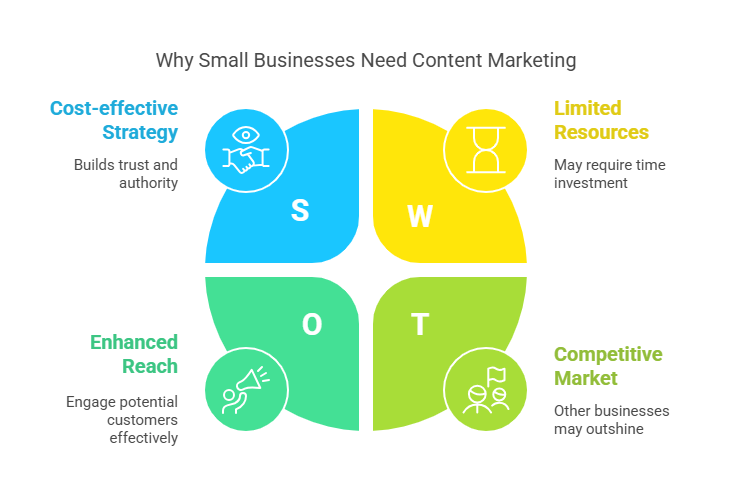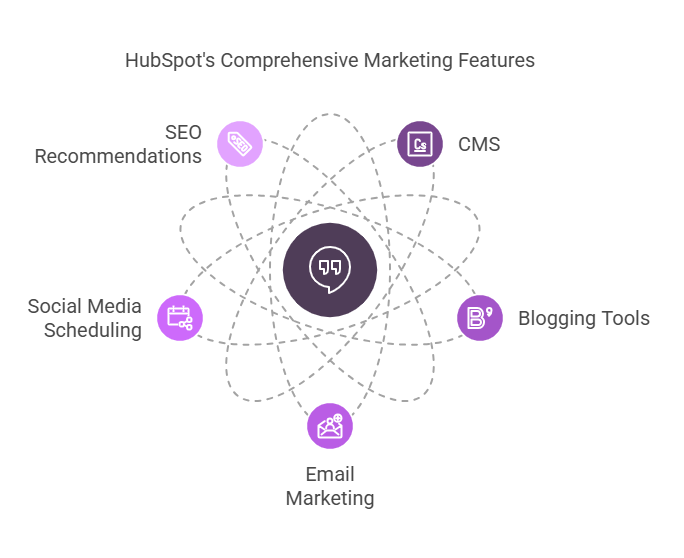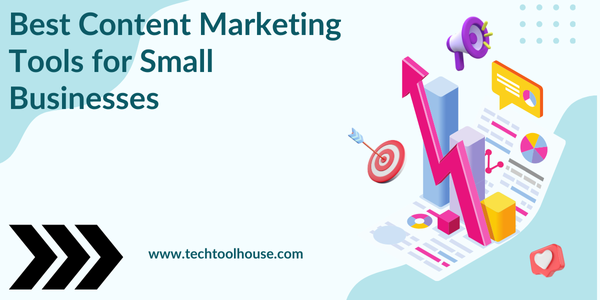Small businesses often face challenges when it comes to marketing. With limited resources, it can be tough to keep up with larger competitors. However, the right content marketing tools can make a big difference. These tools help small businesses create, manage, and optimize their content marketing strategies efficiently and affordably.
This guide will explore the best content marketing tools for small businesses, how they can help, and which tools are worth considering. Whether you’re just starting or looking to improve your marketing strategy, you’ll find valuable information here.
Why Small Businesses Need Content Marketing
Content marketing is one of the most effective ways to reach potential customers. It builds trust and positions your business as an authority in your field. Small businesses, in particular, benefit from content marketing because it allows them to:
-
Connect with their audience
-
Build brand awareness
-
Boost website traffic
-
Establish credibility
As a small business, content marketing is also cost-effective. Unlike traditional advertising, it doesn’t require large budgets. With the right tools, you can get great results at a low cost.

Top Content Marketing Tools for Small Businesses
1. HubSpot
HubSpot is one of the best content marketing tools for small businesses. It offers a variety of features like blog publishing, social media management, email marketing, and SEO tools.
HubSpot’s Content Management System (CMS) is especially helpful for small businesses. It helps you easily create and manage blogs, landing pages, and forms. HubSpot also has powerful analytics to track the performance of your content. You can see what’s working and adjust your strategy accordingly.
Key Features:
-
Easy-to-use CMS
-
Blogging tools
-
Email marketing
-
Social media scheduling
-
SEO recommendations

2. Canva
Creating visuals is a crucial part of content marketing. Canva makes it easy for small businesses to create professional-looking images, infographics, and social media posts. Even if you don’t have graphic design skills, Canva’s drag-and-drop interface is simple to use.
You can create images for blogs, social media, and other marketing materials. Canva also offers templates, making it easy to get started. Best of all, it’s free, with premium features available at a low cost.
Key Features:
-
Pre-designed templates
-
Drag-and-drop editor
-
Social media post creator
-
Free and affordable premium versions
3. Google Analytics
Google Analytics is essential for tracking the success of your content marketing. It helps you understand how visitors are interacting with your website. You can see which blog posts attract the most traffic, which pages have the highest bounce rates, and which content is converting visitors into customers.
For small businesses, this tool is vital for making data-driven decisions. With Google Analytics, you can improve your content strategy by identifying trends and optimizing your content.
Key Features:
-
Traffic tracking
-
Audience insights
-
Conversion tracking
-
Customizable reports
4. Buffer
Social media is an important part of content marketing. Buffer is a simple tool for managing your social media accounts. It allows you to schedule posts, track engagement, and analyze your social media performance.
For small businesses, Buffer’s user-friendly interface makes managing multiple social media accounts easy. It also helps you maintain a consistent posting schedule, which is key to building a loyal following.
Key Features:
-
Social media scheduling
-
Engagement tracking
-
Analytics and reporting
-
Content curation tools
5. Yoast SEO
SEO is critical for content marketing. Yoast SEO is one of the most popular SEO tools for WordPress users. It helps optimize your content for search engines by providing recommendations on keywords, readability, and meta descriptions.
Yoast SEO’s easy-to-follow analysis helps you improve your content’s SEO performance. For small businesses with limited SEO knowledge, this tool makes it simple to ensure your content ranks well on Google.
Key Features:
-
SEO analysis
-
Readability checker
-
Keyword optimization
-
Meta description editor
6. Mailchimp
Email marketing is a powerful way to nurture leads and build relationships with customers. Mailchimp is an affordable and user-friendly email marketing platform that allows small businesses to send newsletters, promotions, and automated email campaigns.
Mailchimp offers customizable email templates and segmentation tools to send targeted content to different audiences. With its easy-to-use features, small businesses can build their email lists and engage their customers effectively.
Key Features:
-
Email campaign creation
-
Customizable templates
-
Automation tools
-
Audience segmentation
7. Trello
Content marketing often requires collaboration between team members. Trello is a project management tool that helps teams organize tasks and track progress. It’s perfect for small businesses that need to manage content calendars, assign tasks, and ensure deadlines are met.
With Trello, you can create boards for each project and use cards to track specific tasks. The simple, visual layout makes it easy to stay on top of your content marketing projects.
Key Features:
-
Visual project management
-
Task assignment
-
Calendar view
-
Collaboration tools
8. BuzzSumo
BuzzSumo is an excellent tool for discovering popular content in your industry. It helps you identify trending topics and keywords, so you can create content that resonates with your audience. You can also analyze your competitors’ content to understand what works for them.
For small businesses looking to stay on top of content trends, BuzzSumo is a valuable tool for finding new ideas and keeping your content strategy fresh.
Key Features:
-
Content discovery
-
Competitor analysis
-
Trend tracking
-
Keyword research
9. Hootsuite
Hootsuite is another social media management tool that allows you to schedule and manage posts across multiple social platforms. It also offers analytics to measure the success of your campaigns.
For small businesses, Hootsuite’s ability to manage multiple social media accounts in one place saves time and effort. It’s a great tool for ensuring consistency across your social media marketing.
Key Features:
-
Social media scheduling
-
Analytics and reports
-
Social listening
-
Multi-platform management
10. CoSchedule
CoSchedule is an all-in-one content marketing calendar that helps you plan, organize, and schedule your content. It is perfect for small businesses looking for an easy way to manage their content marketing efforts.
With CoSchedule, you can create a detailed editorial calendar, track your content’s progress, and collaborate with your team. The tool also integrates with other marketing tools like WordPress, Google Analytics, and social media platforms.
Key Features:
-
Content calendar
-
Task management
-
Team collaboration
-
Integration with other tools
Statistics and Trends
Content marketing is growing rapidly. According to a report by the Content Marketing Institute, 70% of marketers are creating more content than they did last year. Small businesses are catching up, with 50% of small business owners planning to increase their content marketing budgets in 2025.
The demand for video content is also rising. A survey by Wyzowl found that 86% of businesses use video as a content marketing tool, with 93% of marketers reporting that it has helped them increase brand awareness.
FAQs
1. What is content marketing?
Content marketing involves creating and sharing valuable content to attract and engage customers. It helps build trust and authority in your industry.
2. Do small businesses need content marketing tools?
Yes. Content marketing tools help small businesses save time, improve content quality, and measure success.
3. What is the best content marketing tool for small businesses?
The best tool depends on your needs. HubSpot, Canva, Google Analytics, and Buffer are all great choices for small businesses.
4. How can I improve my content marketing strategy?
Focus on creating valuable content, optimizing it for search engines, and promoting it on social media. Use analytics to track your performance and adjust your strategy accordingly.
5. Is content marketing affordable for small businesses?
Yes. Content marketing is cost-effective, especially when compared to traditional advertising. Many tools are free or affordable, making it accessible for small businesses.
Conclusion
Content marketing is essential for small businesses looking to grow their online presence. The right tools can make the process easier and more efficient. HubSpot, Canva, Google Analytics, Buffer, and other tools are great options for small businesses. By using these tools, you can create high-quality content, reach your audience, and track your success.
For small businesses, it’s all about working smarter, not harder. With these content marketing tools, you can achieve your goals without a large budget. Start using them today and watch your content marketing efforts thrive!

